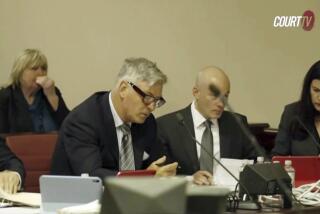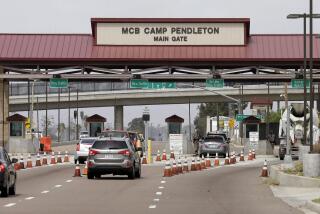Jury chosen for court-martial of Marine in 24 Iraqi deaths
Reporting from Camp Pendleton -- Opposing lawyers Friday asked prospective jurors in the court-martial of an enlisted Marine charged in the deaths of 24 Iraqi civilians a series of questions focused sharply on the morally complex issues central to the long-awaited trial.
Will you be bothered by pictures of dead children?
Do you think that dead children are sometimes the “unfortunate result of combat operations”?
Do you think there are times when it is permissible for Marines to enter a house firing their M-16s and throwing grenades without stopping to determine if women, children and other noncombatants might be killed?
If one Marine starts shooting, does that justify other Marines in doing the same?
And do you think a young leader can be considered derelict in his duties if Marines under his command commit illegal acts?
Such are the issues that are key to the fate of Staff Sgt. Frank Wuterich, 31, the squad leader whose Marines killed two dozen Iraqis in November 2005 in the village of Haditha.
The killings, by gunshots and grenades, were the result of a futile search for the insurgents responsible for a roadside bomb that had just killed one Marine and injured two others.
At day’s end Friday, an eight-man jury — four officers and four enlisted men — had been selected to hear a case that the general who initially brought the charges said reflects the “morally brutalizing environment of war.”
Opening statements are set for Monday.
Told by a lieutenant to “clear” three nearby houses, Wuterich — by his own unsworn admission at a preliminary hearing in 2007 — gave his Marines a shoot-to-kill order.
Moments earlier, Wuterich and other Marines had killed five men pulled from a car near where the bomb had exploded beneath a Marine vehicle. One Marine in Wuterich’s squad urinated on one of the dead Iraqis.
Wuterich, who was on his first combat deployment, is charged with dereliction of duty, manslaughter and assault — charges that carry a cumulative sentence of 152 years in prison. The jurors are combat veterans.
The Haditha case scandalized the American public and had a profound effect on the Marine Corps, ending the careers of three senior officers and the battalion commander, Lt. Col. Jeffrey Chessani, once considered a rising star.
Chessani was forced into retirement even though the criminal charges against him were dropped. He remains the highest-ranking Marine from Camp Pendleton to face criminal charges from Iraq or Afghanistan.
The lessons of Haditha and Chessani’s downfall for not ordering a more thorough investigation of the killings have filtered through Marine ranks.
“I think every professional infantry officer knows something about the case — particularly in the Marine Corps,” said one prospective juror, Col. A.E. Renforth, commander of the 7th Marine Regiment.
Of the 19 Iraqis killed in the houses, three were women and seven were children. Pictures of the bodies lying side by side will be presented by prosecutors.
Prospective jurors were asked individually by the lawyers about their combat experiences in “clearing” houses of insurgents, including houses with insurgents hiding behind women and children.
If there was a common answer, it is that the death of women and children is often a tragic result of war.
“I understand you can’t control everything,” said Master Sgt. Ernest Cardenas. “You control as much as you can.”
Can a leader be held for responsible for the acts of others?
“As Marines, sir, we are all responsible for each other,” Cardenas said.
Gunnery Sgt. David Dalzell said he remembered one particular case in which noncombatants were injured. “It was hard to separate crying children from the mother who was shot in the neck,” he said.
On the issue of responsibility, Dalzell was blunt, earning a rebuke for foul language from the judge: “I’m an acting first sergeant. I’m getting my ass chewed by the sergeant major every time one of my Marines” is arrested for drunk driving.
Defense attorney Haytham Faraj pressed the issue of responsibility with numerous jurors — anticipating that the question of Wuterich’s responsibility for the actions of other Marines may be key.
Capt. Brian Huysman, a veteran of Iraq and Afghanistan, told Faraj that Marines leading other Marines “are responsible for everything their units do or fail to do.... The responsibility never goes away.”
More to Read
Sign up for Essential California
The most important California stories and recommendations in your inbox every morning.
You may occasionally receive promotional content from the Los Angeles Times.










